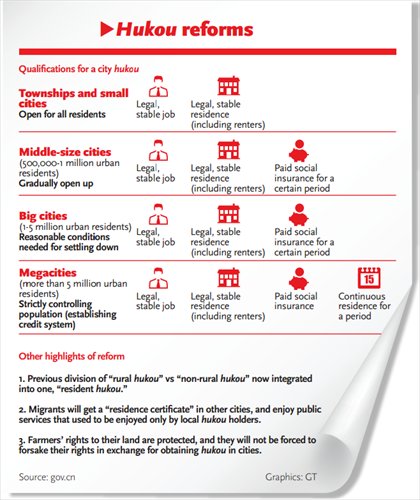 The 4th Chinese National Pole Dance Championship held in Tianjin
The 4th Chinese National Pole Dance Championship held in Tianjin
 Chinese navy commandos debut at 2014 RIMPAC
Chinese navy commandos debut at 2014 RIMPAC
 Guangxi impression: scenic countryside
Guangxi impression: scenic countryside
 World's largest aquatic insect found in Sichuan
World's largest aquatic insect found in Sichuan
 Ceremony volunteers for Youth Olympics make public appearance
Ceremony volunteers for Youth Olympics make public appearance
 A glimpse of female crew of Liaoning aircraft carrier
A glimpse of female crew of Liaoning aircraft carrier
 Stills from "Dad, where are we going?"
Stills from "Dad, where are we going?"
 Legless man's happy life
Legless man's happy life
 Top ten most beautiful islands in China
Top ten most beautiful islands in China
 Aerial view of Hong Kong
Aerial view of Hong Kong
 |
| (Graphics:GT) |
Chinese people will no longer be officially classified as rural or urban dwellers after the government put forward an "unprecedented" reform of the household registration system, or hukou system, the State Council, China's cabinet, announced Wednesday.
The reform will also help some 100 million rural residents settle in cities by 2020.
The move was seen by many as a bold change that aims to reduce social disparities and will signal the authorities' determination to carry out reform.
According to a State Council circular released Wednesday, the government will put an end to the dual-household registration system which has divided people into urban or agricultural households since the 1950s.
Currently, citizens without an urban household registration do not have equal access to public services in cities, such as subsidized social services including healthcare, housing, education or pensions.
The circular said a residential permit system will be introduced to ensure those services will benefit all residents.
"Although pilot programs have been carried out in many local regions, this is the first time hukou reform has been introduced nationwide. It is of such great significance that it could be seen as China's version of Affirmative Action," Hu Xingdou, a law professor with the Beijing Institute of Technology, told the Global Times.
Affirmative Action was first initiated in the US in 1961 to fight discrimination against disadvantaged people.
China's latest household reform will likely affect the lives of some 174 million migrant workers in China, according to the Xinhua News Agency.
Lu Jiehua, a sociology professor at Peking University, told the Global Times that while this reform will bring hope that the Party is aware of social problems and is determined to change the status quo, the mission could prove very difficult.
"With so many people moving to cities, paying for public services is a major problem," Lu said. "Phasing out the dual-hukou system is easy. Providing quality healthcare, pensions, housing and education to all residents is the tricky part."
The government will also remove limits on household registration in townships and small cities, relax restrictions in medium-sized cities, and set qualifications for registration in big cities.
Huang Ming, vice-minister of public security, said Wednesday at a press conference that the household registration reform this time is unprecedented in its scope, impact and the authorities' determination for change. "Anyone who has legal residence [in a city] can register for permanent residence, even temporary tenants," he said.
However, people wishing to settle in megacities like Beijing and Shanghai will have to qualify through a "points system" based on their seniority in employment, their accommodation and social security.
Beijing has also pledged to push land reforms that would protect farmers' rights to their land, and allow them to lease or sell land when they leave villages. The farmers are also guaranteed rights to get a share of the profits their villages make out of collective properties, the circular said.
"Government must rule out the possibilities of land grabs under the name of hukou reform, which will add to the burden of farmers," Hu said.
At a State Council meeting Wednesday, Premier Li Keqiang called on all relevant departments to design plausible measures to provide better services to migrant workers.
"Research has shown China has benefited from the demographic dividend in its decades of rapid development, this dividend was largely contributed by migrant workers," Li said, adding that migrant workers should be welcomed as new members of cities, not second-class citizens.
 Blockbuster? No, it’s firefighters’ posters
Blockbuster? No, it’s firefighters’ posters
 Special 'gifts' for IT men for Chinese Qixi Festival
Special 'gifts' for IT men for Chinese Qixi Festival
 Foreign students' colorful life in China
Foreign students' colorful life in China
 French photographer‘s work 'China 2050' goes viral online
French photographer‘s work 'China 2050' goes viral online A bite of Halal Food
A bite of Halal Food
 Dressed in uniforms to marry you
Dressed in uniforms to marry you
 Female soldier in Chinese special force
Female soldier in Chinese special force
 Zhujiang ambassadors attend lotus lanterns activity
Zhujiang ambassadors attend lotus lanterns activity
 From girly girl to tough special police officer
From girly girl to tough special police officer
 22-year-old veteran travels around China
22-year-old veteran travels around China
 Night scenery of pagoda forests
Night scenery of pagoda forests China suffers from hot summer
China suffers from hot summer 48 hours after super Typhoon Rammasun
48 hours after super Typhoon Rammasun German pianist plays mid-air ‘magic carpet’ show over Munich Airport
German pianist plays mid-air ‘magic carpet’ show over Munich Airport
 China's manned deep-sea submersible conducts dive in Pacific Ocean
China's manned deep-sea submersible conducts dive in Pacific Ocean
Day|Week|Month